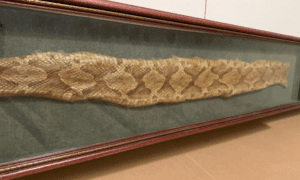Today is Easter Sunday. It is a glorious day. All our churches are spectacularly decorated and full of worshippers. All our music is exhilarating. People look great. All our offerings will probably be the most of any one Sunday. All preaching is inspired. Hallelujahs ring out everywhere. And the chant is repeated over and over again, “He is risen. He is risen, indeed. Hallelujah!” What a day! What a joy!
Eight years ago, I began an article for the Citizen for an Easter Sunday with a paragraph much like that one. Since nothing about Easter has changed in those eight years, I ask you to receive again the remainder of that article as we mark and celebrate the meaning and truth of Easter here in 2024.
We Christians believe Jesus rose from the dead. That is the number one most important part of our faith. Without this as truth and reality, we might as well simply belong to a good service organization. Right? And there are plenty of people who refuse to believe in the resurrection. Something within them resists accepting this. Something within them resists the Holy Spirit’s convincing power. And I also have encountered even some “Christians” who don’t believe it.
Besides the power of the Holy Spirit to work in us our faith in the resurrection of Jesus, what else might help us and others acknowledge and be sure that Jesus, who was obviously fully dead, was then raised back to life?
Three things come to my mind. The first thing that helps me stand firm in my faith in the resurrection, even when I, too, might have a twinge of doubt, is the fact of the “post-resurrection appearances” of Jesus.
Yes, the story does not end that Jesus died, was buried, rose again, and yet afterward nobody saw Him. As a matter of fact, after His resurrection many people saw Him, recognized Him, knew Him to be the same Jesus of Nazareth, and had first-hand visual evidence that Jesus came back to life.
Holy Scripture gives us no less than 12 excellent accounts of Jesus appearing to people after His resurrection. Jesus appeared:
1. To Mary Magdelene at the tomb alone. John 20:11-18.
2. To certain women, “the other Mary,” Salome, Joanna, and others, as they returned from the tomb. Matthew 28:1-10.
3. To Simon Peter alone on the day of the resurrection. Luke 24:34 and 1 Corinthians 15:5.
4. To the two disciples on the road to Emmaus on the day of the resurrection. Luke 24:13-35.
5. To the ten disciples, Thomas being absent, and others “with them,” at Jerusalem on the evening of the resurrection day. John 20:19-24.
6. To the disciples again, Thomas being present, at Jerusalem. John 20:26-28.
7. To the disciples when fishing at the Sea of Galilee. John 21:1-23.
8. To the eleven, and above 500 brethren at once, at an appointed place in Galilee. 1 Corinthians 15:6.
9. To James. 1 Corinthians 15:7.
10. To the apostles immediately before His ascension. Luke 24:50-52.
It is clear in these accounts that those who saw Him also talked with him, carried on conversations with Him, ate with Him, and touched Him. He was certainly no ghost and no vision.
11. In addition to these, Paul declares that he saw and heard the living Jesus on the road to Damascus.
12. Finally, Luke implies in Acts 1:3 that there may have been other appearances.
We Christians declare we believe in “things unseen,” but I am so blessed by these accounts of those who did see Jesus alive after His resurrection. It solidifies my “blind faith” to know that people saw Him, ate with Him, talked in conversation with Him, and touched Him. This helps me. I believe it can help you, too.
The second thing that helps me confirm my faith in The resurrection is the fact that neither the Jewish nor the Roman authorities, both of whom wanted Him dead and gone, ever produced the body of Jesus and said, “Look at this! This is the dead body of Jesus of Nazareth. You can recognize him. Your talk of resurrection is nonsense. You can ‘believe’ he rose if you want to, but the hard proof is that here is his dead body.”
Nope. As bad as we know both of these groups would have wanted to disprove any notion of resurrection, and as hard as they might have tried, they could not bring Jesus’ dead body in as their full-proof evidence. I believe that is significant.
Finally, the fact that Jesus’ disciples “stuck to their story,” even as they were being put to death themselves for believing it, helps me. Can you imagine the scene where the disciples were being tortured and given the chance to be set free if they simply would denounce the resurrection of Jesus? Don’t you believe that in excruciating pain, at least one of them would have given in and said, “O.K., O.K. We made it up. Jesus died and we stole the body and buried it. He didn’t really come back to life. Now, let me go.”
Again, nope. Never happened. Every disciple, except John who might have died naturally, and thousands of others went to their torturous death simply because they knew Jesus rose again and they could do no other than to witness to this divine and eternal truth.
Plain and simple: Jesus rose! Really! And it’s still true! I’m in. All in. I hope you are, too.
[Dr. Kollmeyer, a thirty-eight-year resident of Fayette County, is a retired Lutheran minister now serving as Interim Pastor at St. Martin Lutheran Church on Piedmont Ave. in Atlanta. He is available for preaching or teaching about our faith in the traditional understanding of God’s Word as it applies to us today. Contact him at [email protected].]











Leave a Comment
You must be logged in to post a comment.